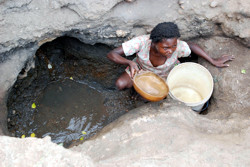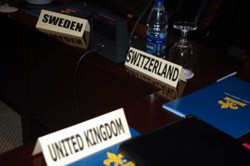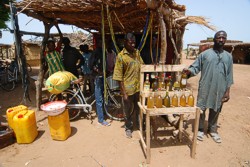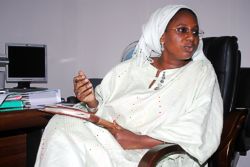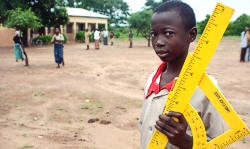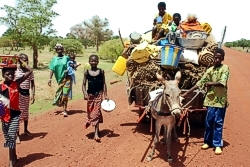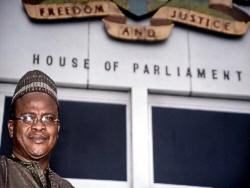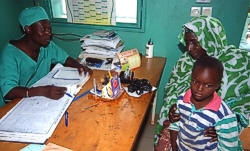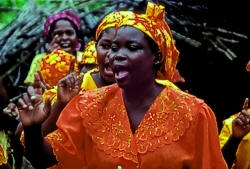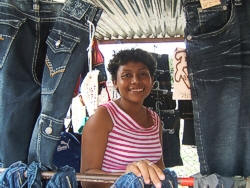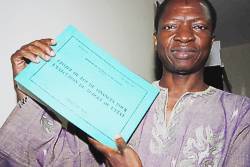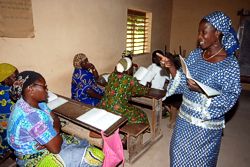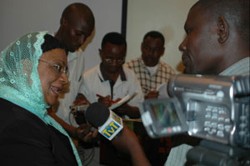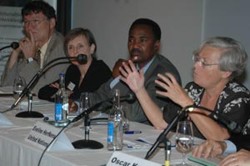RESULTS: BUDGET SUPPORT |
|||||||||||||||||||||||
|
|||||||||||||||||||||||
 |
|
Evaluation of Budget Support Operations in
Senegal The Framework Arrangement for Budget Support (ACAB) between the Government of Senegal and the Development Partners (African Development Bank, Canada, European Commission, France, Germany, Netherlands, World Bank) stipulates an annual and independent evaluation of the functioning of the institutional set-up and the extent to which the parties involved respect their commitments. The Government of Senegal and the group of development partners entrusted the first evaluation, covering the initial year (2008) of the arrangement, to Richard Gerster (Switzerland) and Ameth Faye (Senegal). The study has a particular emphasis on operational issues how to strengthen ownership, ensure compliance with the agreed principles, improve performance and overall dynamise ACAB. The study can be downloaded in French only. |
Output: 58 pp Authors: Richard Gerster / Ameth Faye Download PDF: Senegal ACAB evaluation (français)
|
 |
Budget Support in Practice Series
A country’s government budget is ultimately the construction site where it is decided whether public authorities really act at the service of the population, how they fight abuse and how they render accountability with respect to their performance. The development partners, often among them the African Development Bank, Denmark, EC, France, Germany, Netherlands, Norway, Sweden, Switzerland, United Kingdom and the World Bank jointly support the partner government in its fight against poverty by providing direct contributions to the state’s budget. The State Secretariat for Economic Affairs (SECO), Switzerland, asked Gerster Consulting to take a closer and practical look at budget support from various points of view.
On that background a series of field reports and interviews were written to cover experiences made in Benin, Burkina Faso, Ghana, Mali, Mozambique, Nicaragua and Tanzania. They aim at illuminating chances and risks, possibilities and limitations of budget support in a practical manner with a focus on Switzerland’s experiences. They reflect the author’s personal opinion.
The essays can be downloaded below in three languages English, French, German or accessed at the website www.budget-support.ch
Outputs:
32 articles, 8 interviews (all reports are listed below)
Authors:
Richard Gerster & Franziska Pfister (Nicaragua)
 |
||||
|
Burkina Faso: Budget Support Evaluation 2007 The Memorandum of Understanding between the Government of Burkina Faso and the Development Partners providing general budget support (African Development Bank, Denmark, European Commission, France, Germany, Netherlands, Sweden, Switzerland, World Bank) stipulates an annual and independent evaluation of the functioning of the institutional set-up and the extent to which the parties involved respect their commitments. The Burkinabe Government entrusted the latest evaluation, covering 2007, to Richard Gerster (Switzerland) and Seglaro Abel Somé (Burkina Faso). The study has a particular emphasis on the performance assessment framework for the government as well as for the Development Partners, and on the budget cycle. The study can be downloaded in French only. |
Output: 72 pp Authors: Richard Gerster / Seglaro Abel Somé Download PDF: Evaluation Burkina Faso (français)
|
|||
 |
||||
|
Budget Support Learning Assessment in Benin The Government of Benin and its technical and financial partners (at present the African Development Bank, Denmark, EC, France, Germany, Netherlands, Switzerland and the World Bank) committed to Joint Budget Support mandated Richard Gerster & Augustin Dadé to do an independent learning assessment (“évaluation de l’apprentissage”, EA) of the Joint Annual Review 2008 process. The EA pursued the objective of developing practical recommendations on strengthening the effectiveness and efficiency of budget support programme implementation. The quality of dialogue, performance, accountability and sustainability was to be specifically assessed. Methodologically, the EA made use of good practices developed elsewhere, observations of annual review sessions, interviews, and written feedback. The EA is an effort undertaken in the framework of the Strategic Partnership with Africa (SPA), with financial support of the Swiss State Secretariat for Economic Affairs (SECO), Switzerland. The study can be downloaded in French only. |
Output: 36 pages Authors: Richard Gerster / Augustin Dadé Download PDF: EA Benin (français)
|
|||
 |
||||
|
Aid Effectiveness: The Case of General Budget Support
Strengths, weaknesses, opportunities and risks are discussed in a holistic approach. In view of aid effectiveness and efficiency the author draws on evaluations as well as on experience made in Switzerland’s budget support engagement. It is argued that the budget support methodology could also inspire the cooperation with non-governmental organisations. The study was published in the Swiss Review of International Economic Relations (Aussenwirtschaft) of the University of St. Gall, 2007, part III, pp. 343 – 370. It can be downloaded on the right. |
Output: 28 pp. Author: Richard Gerster Download PDF: Aid Effectiveness & GBS
|
|||
 |
||||
|
Poverty Reduction Budget Support (PRBS) in Zambia: Learning Assessment
The LA pursued the objective of developing practical recommendations on strengthening the effectiveness and efficiency of PRBS-supported programme implementation. The quality of dialogue, performance, accountability and sustainability was to be specifically assessed. Methodologically, the LA made use of good practices developed elsewhere, observations of JAR sessions, interviews, and written feedback. The LA is an effort undertaken in the framework of the Strategic Partnership with Africa (SPA), with financial support of the Swiss State Secretariat for Economic Affairs (SECO), Switzerland. The study can be downloaded on the right. |
Output: 34 pp. Authors: Richard Gerster & Mwila Chikwekwe Download PDF: LA Zambia
|
||
 |
|||
|
General Budget Support in Tanzania: Learning
Assessment
This learning assessment, following a similar exercise in Mozambique in 2004, was undertaken with the financial support of the Swiss State Secretariat for Economic Affairs (SECO), Switzerland chairing the GBS DPG in 2006/07. The report has been released by the GoT and is accessible at the GoT website or can be downloaded on the right. |
Output: 34 pp. Author: Richard Gerster & Ruta G. Mutakyahwa Download PDF: LA Tanzania
|
||
 |
|||
|
Focus on General Budget Support
The text can be downloaded on the right. The entire brochure can be ordered at OEFSE (again, it is available in German only). |
Output: 14 pp. Author: Richard Gerster Download PDF: Focus GBS (German only)
|
||
 |
|||
|
Risks of General Budget Support Different stakeholders participating in budget support have different perceptions of the associated risks. If not addressed actively, the risk is there that donors compete with and crowd out local capacities and sources of financing. These are two out of a number of messages of the presentation “Risks of GBS: a tale of experience” by Richard Gerster, which is available in German and English. It was delivered at the international Symposium “New Paths for Development Cooperation: Budget support as an efficient contribution to the Millennium Development Goals?”, hosted by the Swiss State Secretariat for Economic Affairs (SECO) in Berne, Switzerland, on June 29, 2006. You can download the risk presentation on the right or access the symposium website at http://www.budget-support.ch. |
Output: 8 pp. Author: Richard Gerster Download PDFs: GBS Risks (English) GBS Risiken (German)
|
||
 |
|||
|
Learning from Experience with Performance Assessment Frameworks for General Budget Support: The Case of Mozambique
The overall objective was to gather preliminary lessons on what could be good international practice in the development of Performance Assessment Frameworks (PAFs) for General Budget Support (GBS). The synthesis study (see on the right on this homepage) is based on the experience of three countries which have adopted harmonised PAFs (Ghana, Mozambique, Tanzania), and two which are moving in this direction (Benin, Nicaragua). |
Output: 39 pp. Author: Richard Gerster Download PDFs: PAF Mozambique (English) PAF Mozambique (Français)
|
||
 |
|||
|
Learning from Experience with Performance Assessment Frameworks for General Budget Support
The study is based on the experience of three countries which have adopted harmonised PAFs (Ghana, Mozambique, Tanzania, and two which are moving in this direction (Benin, Nicaragua). In order to assess the effectiveness of these PAFs, the study employed a simplified, standard framework reflecting the OECD-DAC guiding principles for the provision of budget support. This report was jointly written by Oxford Policy Management (David Hoole, Andrew Lawson) and Gerster Consulting (Richard Gerster). |
Output: 80 pp. Authors: Andrew Lawson, Richard Gerster, David Hoole Download PDFs: PAF synthesis (English) Synthèse PAF (Français)
|
||
|
|
|||
|
Perfect Partners? A Case Study on Donor Performance and Accountability
Moreover, the study goes beyond general budget support and presents a proposal for a Mozambican aid strategy. The report was commissioned by the programme aid partners ("G-17" ) (Belgium, Canada, Denmark, the European Commission, Finland, France, Germany, Ireland, Italy, the Netherlands, Norway, Portugal, Spain Sweden, Switzerland, United Kingdom, and the World Bank). Despite the challenges it presents and its undisputable limitations, the study was welcomed by the G-17. This independent report can be accessed at the PAPs website or downloaded on the right. |
Output: 69 pp. Authors: Tony Killick, Carlos N. Castel-Branco, Richard Gerster Download PDF: PAPPA 2005
|
||
 |
|||
|
The G-15 in Mozambique. A Case Study in Harmonisation and Accountability
The formal basis is the Memorandum of Understanding (MoU), signed on April 5, 2004, between the Republic of Mozambique, Belgium, Denmark, the European Commission, Finland, France, Germany, Ireland, Italy, the Netherlands, Norway, Portugal, Sweden, Switzerland, United Kingdom, and the World Bank ("G-15" ). Signatories of the MoU declare that they are determined to work in the spirit of NEPAD, the Monterrey Consensus and the Rome Declaration on Harmonisation. The MoU was prepared in the spirit of mutual accountability and clarifies the performance and reporting commitments of the GoM as well as the Programme Aid Partners (PAPs). The MoU obliges the donors to provide an annual report on their efforts in implementing these obligations. This independent report, written on behalf of the G-15, draws a baseline on donor performance in 2003, in order to be able to regularly monitor PAPs progress in future. The findings on alignment and harmonisation, predictability, transparency, the administrative burden, and capacity building show that, even in the progressive environment for international cooperation that prevails in Mozambique there is considerable room for improvement. |
Output: 26 pp. Author: Richard Gerster and Alan Harding Download PDF: Baseline PAPPA
|
||
 |
|||
|
Budget Support for Decentralisation in the Kyrgyz Republic
(1) technical assistance for capacity building in view of fiscal and legal literacy; (2) budget support at the national and local levels to enhance financial capacities and lead a meaningful policy dialogue at all levels; (3) support to civil society initiatives at the national and local level. Social mobilisation will keep the authorities accountable to the population. The report, commissioned by the Swiss State Secretariat for Economic Affairs (seco), analyses the Kyrgyz context, describes key issues of fiscal decentralisation and local governance, maps the on-going efforts, and presents a framework as well as a roadmap for an eventual Swiss contribution. |
Output: 46 pp. Author: Richard Gerster Download PDF: Decentralisation
|
||
 |
|||
|
Mozambique: Learning Assessment of Programme Aid Cooperation
This unique joint learning exercise was done in view of improving efficiency and effectiveness of international cooperation in the framework of budget support involving broad and intensive policy dialogue. Unique again it may be that this independent assessment is publicly available. |
Output: 56 pp., unpublished research Author: Alan Harding and Richard Gerster Download PDF: Learning Assessment
|
||
 |
|||

